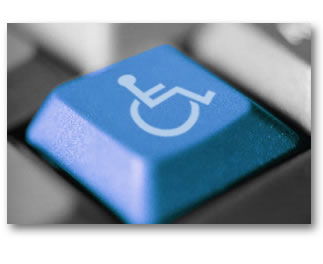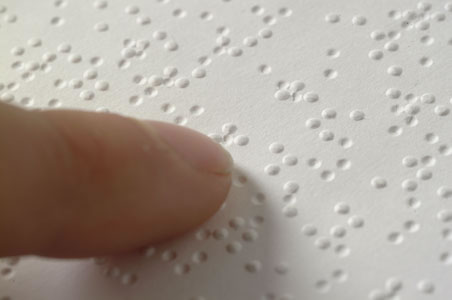
Most people today can hardly conceive of life without the internet. It provides access to news, email, shopping, and entertainment, at any hour of the day or night. Some have argued that no other single invention has been more revolutionary since Gutenberg's printing press in the 1400s. Now, at the click of a mouse, the world can be "at your fingertips"—that is, if you can use a mouse... and see the screen... and hear the audio—in other words, if you don't have a disability of any kind.
The Web Offers Unprecedented Opportunities
The internet is one of the best things that ever happened to people with disabilities. You may not have thought about it that way, but all you have to do is think back to the days before the internet to see why this is so. For example, before the internet, how did blind people read newspapers? They mostly didn't. Audiotapes or Braille printouts were expensive - a Braille version of the Sunday New York Times would be too bulky to be practical. At best, they could ask a family member or friend to read the newspaper to them. This method works, but it makes blind people dependent upon others.
 Most newspapers now publish their content online in a format that has the potential to be read by "screen readers" used by the blind. These software programs read electronic text out loud so that blind people can use computers and access any text content through the computer. Suddenly, blind people don't have to rely on other people to read the newspaper to them. They don't have to wait for expensive audio tapes or expensive, bulky Braille printouts. They simply open a web browser and listen as their screen reader reads the newspaper to them, and they do it when they want to and as soon as the content is published.
Most newspapers now publish their content online in a format that has the potential to be read by "screen readers" used by the blind. These software programs read electronic text out loud so that blind people can use computers and access any text content through the computer. Suddenly, blind people don't have to rely on other people to read the newspaper to them. They don't have to wait for expensive audio tapes or expensive, bulky Braille printouts. They simply open a web browser and listen as their screen reader reads the newspaper to them, and they do it when they want to and as soon as the content is published.
Similarly, people with motor disabilities who cannot pick up a newspaper or turn its pages can access online newspapers through their computer, using certain assistive technologies that adapt the computer interface to their own disabilities. Sometimes the adaptations are simple, such as having the person place a stick in the mouth and use it to type keyboard commands. In other cases, the adaptations are more sophisticated, as in the use of special keyboards or eye-tracking software that allows people to use a computer with nothing more than eye movements. People who are deaf always had the possibility of reading newspapers on their own, so it may seem that the internet does not offer the same type of emancipation that it does to those who are blind or to those with motor disabilities, but they can read online transcripts of important speeches or view multimedia content that has been fully captioned. Many people with cognitive disabilities can also benefit greatly from the structure and flexibility of web content.
Falling Short of the Web's Potential
Despite the web's great potential for people with disabilities, this potential is still largely unrealized. For example, some sites can only be navigated using a mouse, and only a very small percentage of video or multimedia content has been captioned for the Deaf. What if the internet content is only accessible by using a mouse? What do people do if they can't use a mouse? And what if web developers use graphics instead of text? If screen readers can only read text, how would they read the graphics to people who are blind?
As soon as you start asking these types of questions, you begin to see that there are a few potential glitches in the accessibility of the internet to people with disabilities. The internet has the potential to revolutionize disability access to information, but if we're not careful, we can place obstacles along the way that destroy that potential and which leave people with disabilities just as discouraged and dependent upon others as before.